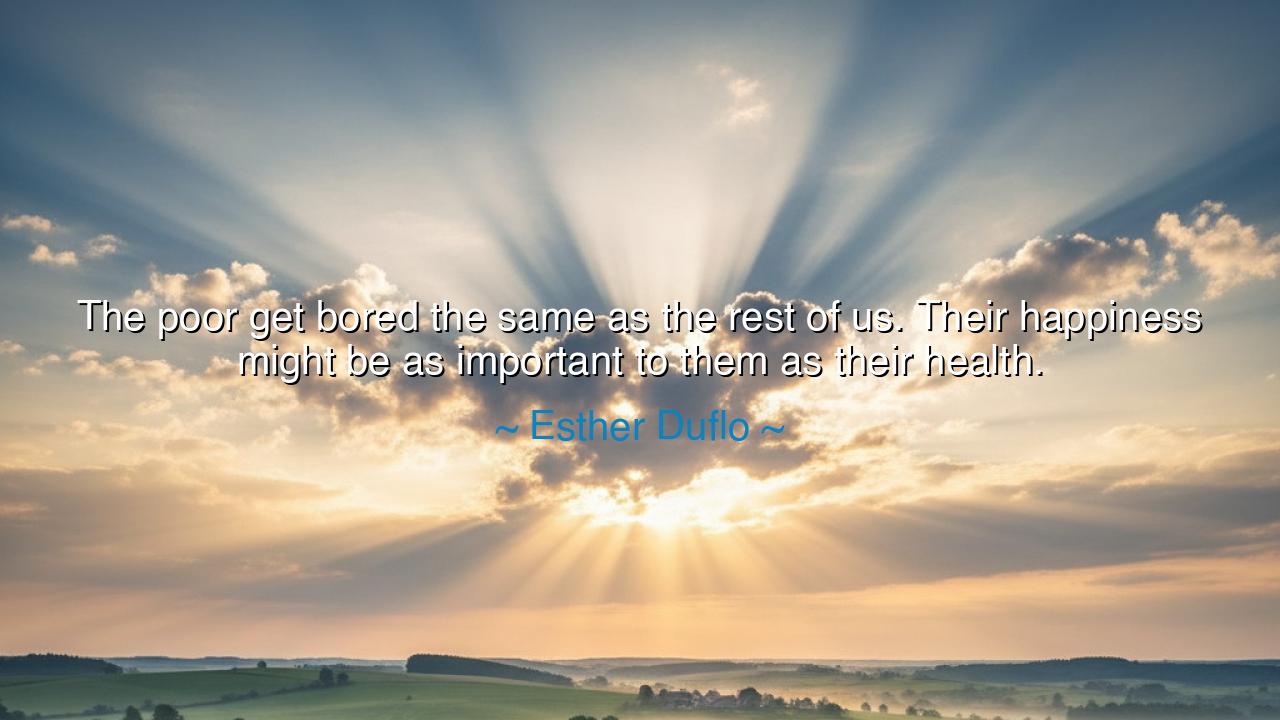
The poor get bored the same as the rest of us. Their happiness
The poor get bored the same as the rest of us. Their happiness might be as important to them as their health.






Hear now the words of Esther Duflo, a seeker of truth among the realms of poverty and progress, who declared: “The poor get bored the same as the rest of us. Their happiness might be as important to them as their health.” These words, though gentle in tone, strike like a bell through the chambers of conscience. They remind the comfortable and the powerful that the poor are not creatures of mere survival, but human souls — complete, complex, and desiring not only bread for the body, but joy for the spirit. In this saying lies a rebuke to arrogance and a call to compassion: that the dignity of man is not measured by wealth, but by the shared pulse of longing, hope, and joy.
The origin of this quote comes from Duflo’s tireless work as an economist and co-founder of the Abdul Latif Jameel Poverty Action Lab. In her studies across the villages of India and Africa, she observed what many overlook — that even the poorest families spend money on small pleasures: a radio, a festival, a bit of sugar, or a film ticket. The world’s economists often dismissed such spending as folly, arguing that every penny should go to health, food, or education. But Duflo saw what the ancient sages always knew: that the soul hungers as much as the stomach. Without happiness, even survival loses its meaning. For what is the worth of life if stripped of color, laughter, and rest?
The ancients, too, spoke of this truth. The philosopher Epicurus, though often misunderstood, taught that the pursuit of happiness — not wealth, not power — was the root of the good life. Yet his happiness was not indulgence, but tranquility: a cup of water, the company of friends, the warmth of a small fire. To be human is to need both nourishment and delight. The rich may seek happiness in comfort, the poor in song — but the longing is the same flame. When Esther Duflo speaks of boredom among the poor, she reminds us that they too yearn for meaning, for beauty, for the brief escape from toil that makes life more than endurance.
There is a story from the slums of Nairobi, where a charity once gave families vouchers — not for food or medicine, but for music lessons and theater performances. At first, outsiders scoffed. Yet months later, the community was transformed. Neighbors laughed together; children danced; people spoke of pride and joy. Even their health improved, for their spirits were lifted. The people, once seen as mere statistics of poverty, became whole again — because someone remembered that happiness is as vital as bread. In this, Duflo’s words find living proof: that the human heart, wherever it beats, longs for beauty, belonging, and joy.
But this truth demands humility from those who help others. Too often the wealthy imagine the poor as shadows — creatures who exist only to be pitied or fixed. They offer aid without empathy, medicine without mercy. Duflo calls upon the world to look deeper, to see the poor not as objects of charity, but as equals in humanity. To understand that a mother in a hut, who buys a small sweet for her child though she has little, is not foolish — she is wise in the oldest way. She knows that happiness, even in its smallest form, nourishes the soul as surely as bread nourishes the flesh.
There is a kind of justice in joy. When a society believes that only the rich deserve comfort, leisure, or laughter, it robs itself of harmony. For joy is not a privilege; it is a birthright. The music in a street market, the festivals of the poor, the laughter shared among laborers at dusk — these are not distractions, but the pulse of civilization. When leaders, scholars, and benefactors remember this, their compassion grows wiser; when they forget it, their aid becomes cold and hollow.
So take this as your teaching, O listener of the living world: never measure a person’s worth by what they own, nor assume that necessity cancels the right to happiness. When you give, give not only what sustains life, but what makes it joyful. Bring not only bread, but dignity; not only medicine, but music; not only shelter, but hope. For as Esther Duflo teaches, the poor get bored as we do, and their happiness — their laughter, their dreams, their delight — is no less sacred than their health.
Thus, let this truth endure like a flame: to be human is to hunger for joy. In every act of mercy, in every work of service, remember this — that the world is not healed by numbers alone, but by the laughter of its people. Feed the body, yes, but also feed the soul. For when all men can dream and dance and rest beneath the same sun, then — and only then — will humanity be whole.






AAdministratorAdministrator
Welcome, honored guests. Please leave a comment, we will respond soon